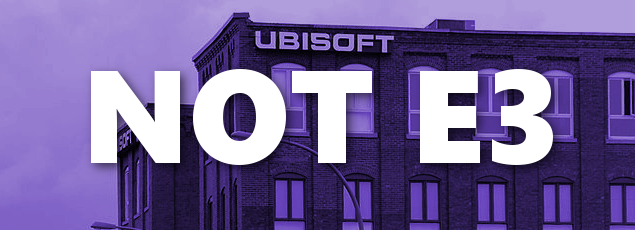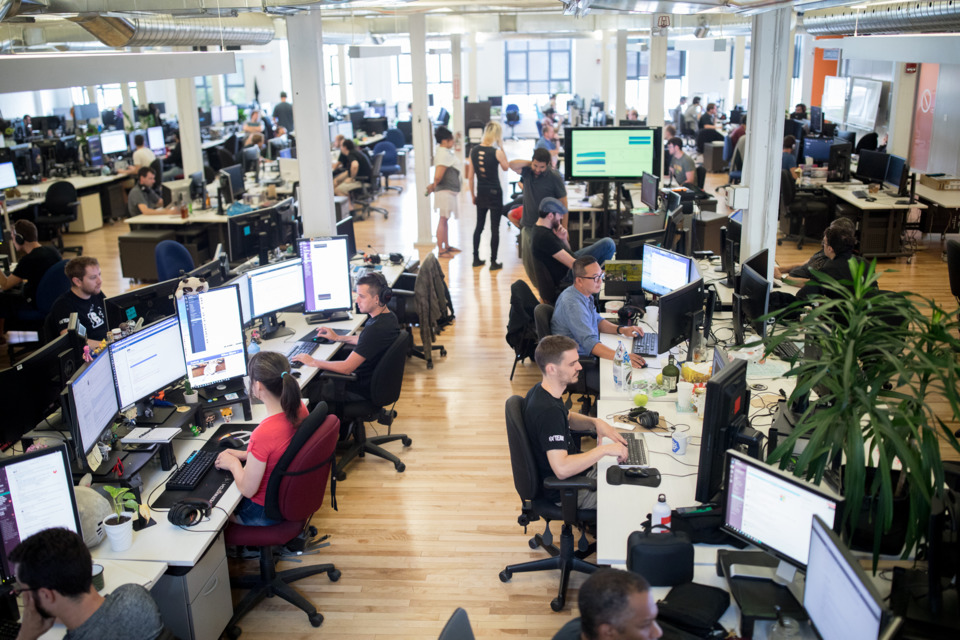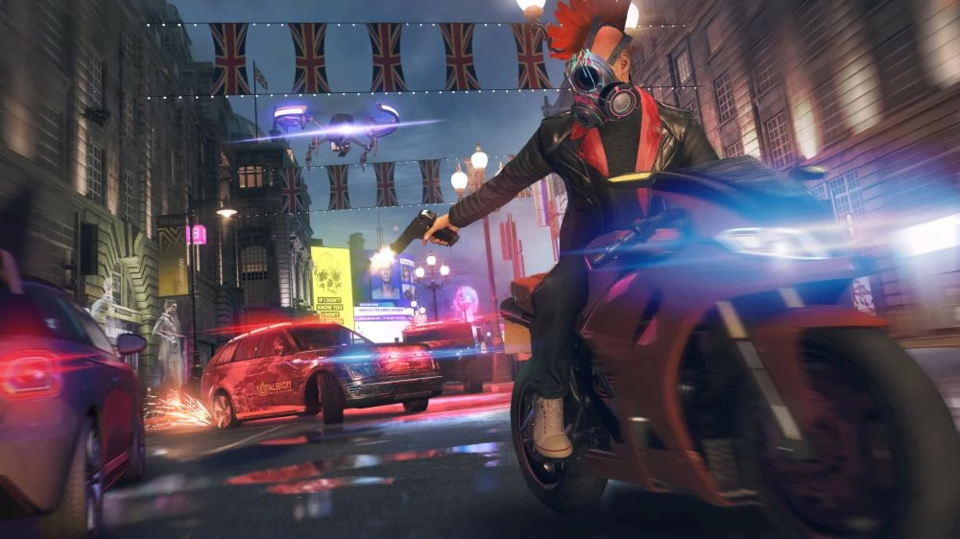Note: The links and blocked-out text in this article contain descriptions of physical and sexual harassment. These acts are deliberately not described in the plaintext.

If the climate were different, I'd use a surrogate E3 article like this to jot down my thoughts on the games Ubisoft will be pushing into stores over the next year. Given the recent news from within the company, I think a more helpful use of this space would be to reflect on how we talk about the games industry's work environments and how we relate to products developed in those environments. We need to talk about these topics because discussions about the creation of video games are riddled with double standards.
All of us agree that there are instances in which a game's development history is inextricable from its identity. Which studio built a game, what labour force and budget they deployed, which engine they used, whether any superstar creatives were on deck, if the studio localised their title from another region. These are just some of the details that we believe tell us what a game is. However, if you start bringing up abusive practices and discriminatory structures at studios, a lot of fans will flip to treating the conditions of development as distant from the identity of the game. I have to ask if the attitudes of management and the culture of a company are irrelevant to the medium, then why do care who makes games?
Another thing I've never understood: There's a divide between which ethical issues are meant to matter to us as players and which aren't. You won't ruffle many feathers by saying that developers have a responsibility to take care of their customers, and are misserving them when they pollute an experience with unregulated lootboxes, aggressive microtransactions, and invasive DRM. But suggest that studios have a duty to protect and respect the workers under their wings and you'll receive no small number of excuses for why that can't happen. The sorting algorithm of this selective outrage is not arbitrary. The behaviours which receive universal criticism are those which affect the consumers of games, while the more divisive issues are the ones that primarily affect the workers making games.
This cold attitude towards developers creates lopsided priorities where tiny wrinkles in a title's netcode can mean everything. However, whether talented women were allowed into positions where they could best shape the game is outside the scope of the conversation. It's a mode of criticism where an overpriced season pass is a travesty but developers barely getting to see their families for months on end is the acceptable cost of doing business.

There's no justifying this thinking. Who works on a project, how they work on it, and what the ethics of the industry are are relevant to games and development studios, and we shouldn't tune this information out when it becomes uncomfortable. That being the case, when a company like Ubisoft talks about the games that they're releasing over the coming quarters, but doesn't address the abusive conditions those titles were crafted in, they're not giving us the full picture of those games. In this particular example, the company in question declared that they recorded their replacement E3 show before the recent upheaval at their offices and that's why they couldn't use the stream to confront the accusations of abuse. However, we're talking about a company that owns €3.6 billion in assets. If they wanted to push their livestream back a few days to slap an introduction onto it, they have that power. They made a conscious choice to do otherwise.
For my part, I don't want to downplay the severity of the damage Ubisoft did by talking around it. Let's be clear: If Ubisoft or we turn a blind eye to the behaviour within those walls, then we're knowingly ignoring allegations of a manager strangling a woman, of another raping a woman, of a third forcibly intoxicating his employees and ranting that a female colleague should be "passed around" by her co-workers. There are plenty more sickening accounts of misconduct within that firm, and if you can't empathise with victimisation as painful as this, I'm not sure there's anything I could say that would make you care about a developer.
Perhaps you believe that we should reserve judgement on each case until it's been investigated sufficiently. Yet, a point that Ubisoft whistleblowers are circling is that the company systemically discourages and sabotages research into apparent abuses, or doesn't act on the evidence they dredge up. Ubisoft's HR department was, for a period, run by a co-founder of the company who was also the wife of one of the accused abusers. According to the testimonials in Libération, human resources already knew about more than half of the cases that whistleblowers thrust into the media spotlight, but that knowledge didn't translate into action. The HR team's neglect led to one of their own identifying the department as "the silencing wing of Ubisoft". Various outlets have quoted employees at the studio expressing that they felt they shouldn't report management harming them because of their harassers held senior positions or because they knew previous reports had fallen on deaf ears.
It's a story that echoes through every industry, and if you care about the truth, you should be pushing everyone to pay attention to employee complaints. Instead, I see people simultaneously calling the accounts of harassment hearsay, while also curtailing discussion about investigating those testimonies. Put those two positions together, and you get the opinion "I don't know whether leaders at Ubisoft have hurt other people, and let's keep it that way".

I struggle to believe that you see the volume of smoke that is rising from that company without a fire. If there's a ghost of a chance that abuse is happening in a workplace, none of us can argue that it should go unaddressed, and at Ubisoft, there have been over 100 reports of harassment filed to the HR department. The developer agrees that something's rotten in their management style and has promised sweeping reforms to its processing of harassment claims. However, its system for cleaning out abusive employees failed its workforce time, and time again, so there's reason to be sceptical that it can change.
The company's silence during its flagship live stream of the year further raises doubts about its commitment to reform. You wouldn't expect a corporation that can't pay lip service to an internal restructuring, in the most public of arenas, to be capable of that restructuring. And make no mistake, company image was a particular focus for Ubisoft during this show. Not only did it gild the stream with shots of smiling employees and clean, well-equipped offices; in its profiles on Level Artist, Amanda Mundt, and Production Manager, Anamaria Musca, Ubisoft was selling an idea of what it's like to work for it.
Plenty of other corporations film worker portraits and their purposes are unambiguous. For hires in the making, they signal that the firm would be an environment that provides creative fulfilment and freedom. For prospective consumers, these adverts reassure them that when they buy from the company, they're helping to empower workers. They also suggest that the product or service customers receive will be of a higher quality because passionate and caring hands made it. But we know that these segments were papering over a darker side of Ubisoft.
I'm not saying that the featured developers and other workers at the studio haven't experienced happiness in their jobs. What I am saying is that if it weren't for labourers waving a red flag very recently, these rose-tinted self-plugs would be our prevailing idea of what life is like for a Ubisoft developer. Management was happy to create that illusion while repeatedly ignoring complaints of sexual assault and mistreatment from the mouths of their workers. Now is an excellent time to think about how many other companies have made cosy little snapshots of life under their management, and how little those tell us when a company like Ubisoft can hide an ethically compromised culture behind them.

The toxic influence of Ubisoft and similar companies is even relevant to a few of the games in development at the studio. Watch_Dogs is a series critical of private interests in the computing sector exploiting inequality and allowing the powerful to prey on the average person. Watch_Dogs Legion was made at a tech corporation branch where exactly that happened. If we can believe Hyper Scape's trailer, it is, bizarrely, an action game from the same company more sympathetic to Silicon Valley. It suggests that a video game producer can provide all the escape you need from the slings and arrows of the offline world and maybe even the tools to fight back against them. The reality is that the industry is making a lot of its employees lives worse, with little recourse. This causes Hyper Scape's techno-capitalist optimism to fall short, and means it's overhyping Ubisoft's potential to cure an ailing social climate.
Knowledge of the nature of these games and the work environment they were manufactured in adds not just to our general understanding of the medium and industry. It is also necessary for us to make informed decisions about who and what in the industry we're supporting, whether that support is drawing attention to products or supplying money to their owners. We deserve to know if spending our income on a commodity would reinforce sexist and abusive company practices. Not that it's as simple as us needing to boycott or oppose Ubisoft because the company is 100% toxic.
Marketing efforts frame brands as singular entities with a consistent set of values from top to bottom, but this is never the reality for any sizeable firm because all of them are staffed by a variety of individuals, each with their own experiences and goals. In this instance, there is no sole "Ubisoft": Ubisoft is a collection of people, some of whom are abusers or who perpetuate a system of inequality, some of whom are abuse victims or who suffer from that system, and some of whom will be bystanders. Titles like Watch_Dogs Legion and Assassin's Creed Vallhalla represent the work of bad actors, but also of the people who've laboured under them and come out the other side.
To make matters more complicated, we have to transact with studios as if they were singular economic entities. There's no way to praise, promote, and purchase the work of the average Ubisoft developer without also supporting probable abusers. Likewise, if you choose not to give Ubisoft your speech or cash because of their terrible history on harassment issues and treatment of female employees, you also keep your aid from those very same workers and opt-out of helping their creations bloom. Not that consumerism is the only way to support employees, but there is a catch 22 here.

"Fixing" the industry or even making ethical choices about how we interact with it is never going to be easy, and it's never going to be straightforward. However, we can't act responsibly towards video game businesses if we deny that they harbour problems outside of those which directly harm customers. E3 earned itself the nickname "Gamer Christmas", but we're all adults. We can't act like software is built by elves and delivered in Santa's sleigh; it's laboured on by human beings in a social environment. Work environments typically harbour imbalances of power which lend themselves towards biases and mistreatment by those higher on the social ladder, targeted at those on lower rungs. And games are not gifts wrapped in ribbon; they are, economically speaking, products, and so, are tangled up in company politics, marketing campaigns, and transactional decisions. If you're not acknowledging these aspects of the industry, you're not acknowledging the reality of the medium. Thanks for reading.
Sources
- Ubisoft Employees Have 'Grave Concerns' Over Toronto Studio's Misconduct Allegations by Ethan Gach (July 6, 2020), Kotaku.
- New report on Ubisoft reveals more shocking sexual harassment allegations by Wesley Yin-Poole (July 11, 2020), Eurogamer.
- Ubisoft Brand Marketing Manager Accused of Rape by Fynn Bailey (June 22, 2020), Screen Rant.
- The title image is derivative of a photograph of the Ubisoft Montreal Offices Exterior by Shuichi Aizawa. Licensed under Creative Commons Attribution 2.0 Generic.
All other sources are linked at relevant points in the article.
Log in to comment